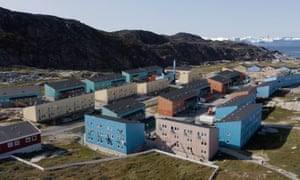'Ecological grief': Greenland residents traumatised by climate emergency
Islanders are struggling to reconcile impact of global heating with traditional way of life, survey finds
Life on thin ice: mental health at the heart of the climate crisis
Life on thin ice: mental health at the heart of the climate crisis

The climate crisis is causing unprecedented levels of stress and
anxiety to people in Greenland who are struggling to reconcile the
traumatic impact of global heating with their traditional way of life.
The first ever national survey examining the human impact of the climate emergency, revealed in the Guardian on Monday, shows that more than 90% of islanders interviewed fully accept that the climate crisis is happening, with a further 76% claiming to have personally experienced global heating in their daily lives, from coping with dangerous sea ice journeys to having sled dogs euthanised for economic reasons tied to shorter winters.
The Greenlandic Perspectives Survey was carried out by the University of Copenhagen’s Center for Social Data Science, the Kraks Fond Institute for Urban Economic Research and the University of Greenland. The study samples almost 2% of the population, spanning an area almost three times the size of France. An equivalent study in the UK would involve a sample of almost 1 million citizens.
Scattered across 17 small towns and approximately 60 villages, all situated on a narrow coastal strip, Greenland’s residents have often been overlooked by data science. The island faces some of the most acute social issues in the world with high levels of alcoholism and historically disproportionate rates of suicide.
According to its lead author, Kelton Minor, the survey
finally gives Greenland’s most remote and inaccessible communities a
voice on the climate crisis.The first ever national survey examining the human impact of the climate emergency, revealed in the Guardian on Monday, shows that more than 90% of islanders interviewed fully accept that the climate crisis is happening, with a further 76% claiming to have personally experienced global heating in their daily lives, from coping with dangerous sea ice journeys to having sled dogs euthanised for economic reasons tied to shorter winters.
The Greenlandic Perspectives Survey was carried out by the University of Copenhagen’s Center for Social Data Science, the Kraks Fond Institute for Urban Economic Research and the University of Greenland. The study samples almost 2% of the population, spanning an area almost three times the size of France. An equivalent study in the UK would involve a sample of almost 1 million citizens.
Scattered across 17 small towns and approximately 60 villages, all situated on a narrow coastal strip, Greenland’s residents have often been overlooked by data science. The island faces some of the most acute social issues in the world with high levels of alcoholism and historically disproportionate rates of suicide.
He said: “The Arctic is a bellwether for the unequal impact of global warming on social and economic systems. As countries struggle to limit future risks and overall warming to 1.5C [an increase of 2.7F], many Arctic and Greenlandic residents are already living in regional climates that have changed by more than this, in less than a lifetime.
“Therein lies the paradox: while satellites and sensors monitor the surface of Greenland’s ice sheet, chase icebergs and scan sea ice daily, relatively little is known about what the residents of Greenland think about their changing surroundings.”
According to the data, detailed in a Guardian investigation carried out across Greenland in the last month, the majority of local residents interviewed believe that the climate emergency will harm its people, sled dogs, plants and animals. The revelation contradicts arguments that local people believe climate breakdown will benefit the Arctic and raises concern over a growing mental health crisis around climate in the polar region.
Minor said: “We find that a large majority of the Greenlandic population thinks that local sea ice has become more dangerous to travel on in recent years, suggesting that perceptions of growing risk are widespread for this important social, ecological and economic platform used by residents from all regions. Importantly, we find that residents are more likely to feel negative rather than positive sentiment when thinking about climate change, recent changes in sea ice, as well as glacial changes.”
The survey is revealed as the Arctic faces potentially record warming levels. According to the National Snow and Ice Data Center in Colorado, US, Greenland has already lost more than 250bn tonnes from a combination of melt runoff and low total snowfall in July.
For mental health professionals who specialise in the polar region, the latest survey findings from Greenland will present another red flag for the Arctic’s vulnerable Inuit communities. According to Courtney Howard, the board president of the Canadian Association of Physicians for the Environment, who lives and works in the Arctic, the intersection between the climate emergency and mental and physical health will become one of the world’s major issues.
Howard said: “Temperature change is magnified in circumpolar regions. There is no question Arctic people are now showing symptoms of anxiety, ‘ecological grief’ and even post-traumatic stress related to the effects of climate change.
“We are challenging the medical profession to acknowledge the world we are inheriting. Schools and universities aren’t considering how climate change will affect people, from a medical or a psychological perspective, so we are not training a new generation of medical professionals to help people in a fast-changing planet and this is intolerable. We are moving too slowly on this.”
As the crisis escalates…
… in our natural world, we refuse to turn away from the climate catastrophe and species extinction. For The Guardian, reporting on the environment is a priority. We give reporting on climate, nature and pollution the prominence it deserves, stories which often go unreported by others in the media. At this pivotal time for our species and our planet, we are determined to inform readers about threats, consequences and solutions based on scientific facts, not political prejudice or business interests.More people are reading and supporting The Guardian’s independent, investigative journalism than ever before. And unlike many news organisations, we have chosen an approach that allows us to keep our journalism accessible to all, regardless of where they live or what they can afford. But we need your ongoing support to keep working as we do.
The Guardian will engage with the most critical issues of our time – from the escalating climate catastrophe to widespread inequality to the influence of big tech on our lives. At a time when factual information is a necessity, we believe that each of us, around the world, deserves access to accurate reporting with integrity at its heart.
Our editorial independence means we set our own agenda and voice our own opinions. Guardian journalism is free from commercial and political bias and not influenced by billionaire owners or shareholders. This means we can give a voice to those less heard, explore where others turn away, and rigorously challenge those in power.
We need your support to keep delivering quality journalism, to maintain our openness and to protect our precious independence. Every reader contribution, big or small, is so valuable. Support The Guardian from as little as $1 – and it only takes a minute. Thank you.





No comments:
Post a Comment